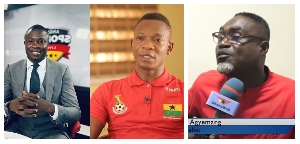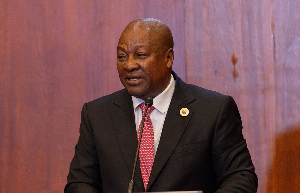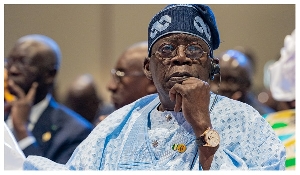The recent upholding of the High Court’s acquittal of businessman Alfred Woyome by the Court of Appeal – as far as criminal charges levelled against him, in connection with the fraudulent receipt of GHS51.2 million from the State were concerned – not only makes Ghana look like a “banana republic”, but also amounts to a “vote for impunity”.
That is the verdict of Editor-in-Chief of the New Crusading Guide newspaper Kweku Baako Jr.
“…Let’s be honest, I respect the court and I have no right to scandalise the court, but I think I have every right to criticise verdicts that are given by the court…I vehemently disagree with this thing. It’s making this country look like a banana republic, which we are not. It is a vote for impunity, which should not be countenanced. I’m being honest with you. And if we are not careful, it can lead to a situation where people will think the courts mean nothing, even though I’m cautioning against that,” Mr Baako told Samson Lardi Anyenini on Joy FM’s news analysis programme Newsfile on Saturday March 12.
“In the legal aspect, I am still convinced that there was sufficient evidence before the court – both in the first instance and the Court of Appeal – not to have come to the verdict that they came to. I’m not a lawyer. I’m a lay man, so, perhaps, I have to be cautious with the kind of submission that I make when it comes to the law. Put the stakeholders aside, there were others, who went to court to testify. The late Van Lare Dosoo, he was chairman of the valuation tendering committee. They evaluated those financial instruments and documents that Woyome was relying on. Their report is there, it’s on record, his own testimony is on record and it tears Woyome’s defence into shreds. He was part of the stakeholders in a way, in terms of looking at the bigger picture. The police investigator, his testimony – and I have all the transcripts here, I have the full records of proceedings, the last ones I have here I‘ve been reading through them – nobody, and I tell you nobody, and I’m sorry to say this if it’s blasphemous, not even God can convince me that the testimony the police officer put forward did not undermine and destabilise Woyome’ s defence…” Mr Baako insisted.
The Court of Appeal on Thursday March 10 dismissed an application brought by the State through the Attorney General, challenging the High Court’s acquittal of Mr Woyome as far as criminal charges against him, in connection with the payment of GHS51.2 million to him.
At Thursday’s hearing, a three-member panel dismissed the appeal with reason that prosecutors failed to establish the criminal charges levelled against Mr Woyome.
Mr Woyome was paid the GHS51.2 million after he sued the state over an alleged breach of a purported contract between him and the Government. In connection with the termination of the same alleged contract, foreign construction firm, Waterville Holdings BVI, was also paid €25 million.
In the Waterville case, the Supreme Court, on June 14, 2013, declared as null and void, and of no operative effect, the contract between the firm and the Government of Ghana titled: ‘Contract for the Rehabilitation (Design, Construction, Fixtures, Fittings and Equipment) of a 40,000 Seating Capacity Baba Yara Sports Stadium in Kumasi, Ghana’ entered into between the Republic of Ghana and Waterville Holdings Limited (BVI), of P.O. Box 3444, Road Town, Tortola, British Virgin Islands on April 26, 2006.
The ruling was premised on the basis that the alleged contract, which was the ground for the payment of the judgment debt to Waterville, following its alleged illegal termination, contravened Article 181 (5) of the 1992 Constitution, which required such contracts to go to Parliament for approval. The same court ruled that Mr Woyome did not merit the GHS51.2 million based on similar grounds.
Mr Woyome promised to refund the money by the end of 2015. In March last year, his lead counsel, Sarfo Boabeng, told the nine-member Supreme Court panel that heard the AG’s application for the retrieval of the money that his client had already resolved to make the payment at the end of 2015.
Mr Woyome’s accounts and assets were frozen about three years ago after he was arrested and charged for causing financial loss to the State, as well as defrauding by false pretence, with regards to the payment made to him between 2009 and 2010 under Mrs Betty Mould-Iddrisu and Mr Ebo Barton-Odro, as Attorney General and Deputy, respectively.
However, he was acquitted and discharged by a High Court on two counts of defrauding by false pretences and causing financial loss to the state.
According to the presiding judge, John Ajet-Nasam – who is one of 34 judges being investigated by the Chief Justice for corruption and who was recently removed from the judiciary on the orders of President John Mahama after investigations regarding his bribery conduct found him to have sullied his office – the prosecutors failed to prove Mr Woyome fraudulently obtained the GHS51.2 million.
Justice Ajet-Nasam also indicted the prosecution for failing to call Mrs Mould-Iddrisu, Mr Rex Magnus Danquah, Mr Barton-Odro, Mr Paul Asimenu, Mr Samuel Nerquaye-Tetteh and others – who had all given written opinions that Mr Woyome was entitled to the money – as witnesses.
Subsequently, a civil suit on the same case by Mr Amidu resulted in the apex court ruling that Mr Woyome, as well as Waterville, did not merit the payment for the work they allegedly did for the state ahead of Ghana’s hosting of CAN 2008, since he had not parliamentary approval for the contract that covered that endeavour.
Anti-corruption crusader Martin Amidu recently filed a suit at the Supreme Court praying the highest court of the land to throw out a suit filed by one Abdulai Yusif Fanash Muhammed, in which he is praying the same court to overturn its own ruling in which it said Mr Woyome must refund the GHS51.2 million.
The Hohoe resident sued Mr Amidu, the Attorney General, and Mr Woyome for a declaration that “the financial engineering claims by Alfred Agbesi Woyome arising out of the tender bid by Vamed Engineering GmbH/Waterville Holdings during the procurement process from June 2005 until its wrongful abrogation in August 2005, is not an international business transaction within the meaning of Article 181 of the Constitution, 1992,” for which reason parliamentary endorsement would have been necessary.
President Mahama told journalists at the Flagstaff House on January 12 that Abdulai Muhammed’s action frustrated processes by the AG to retrieve the money from Mr Woyome. That case was recently thrown out by the Supreme Court as “frivolous”. Mr Woyome, also recently pleaded with the court to allow him refund the GHS51m in installments within three years.
General News of Saturday, 12 March 2016
Source: classfmonline.com
Upholding Woyome's acquittal is 'impunity' - Kweku Baako
 Kweku Baako Jr
Kweku Baako Jr
Sports

John Paintsil’s defamation case involving Countryman Songo and three others resumes on February 17
Entertainment









